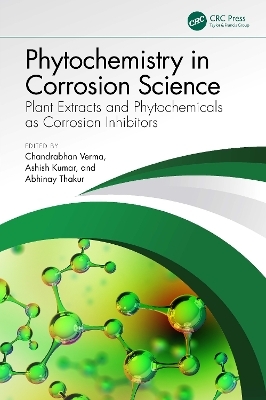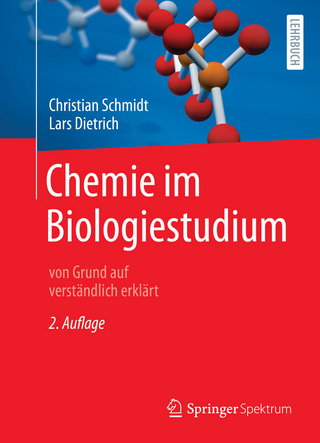
Phytochemistry in Corrosion Science
CRC Press (Verlag)
978-1-032-49615-3 (ISBN)
Phytochemistry in Corrosion Science covers the use of plant extracts/phytochemicals in corrosion mitigation with industrial applications. It explores innovative and characterization approaches toward the utilization of plant extracts and their phytochemicals as potential corrosion inhibitors for several metals and their alloys.
Providing a comprehensive overview of the green aspects of plant extracts as corrosion inhibitors, this book discusses the preparation of aqueous and organic phase extracts, and their advantages, disadvantages, and use for different aggressive media. It also examines aqueous and organic extracts that have been successfully used as corrosion inhibitors for various metals and electrolyte combinations.
This book will be a useful reference for undergraduate and graduate students and academic researchers in the fields of phytochemistry, corrosion science and engineering, environmental science, chemical engineering, green chemistry, and mechanical/industrial engineering.
Dr. Chandrabhan Verma works at the Department of Chemical Engineering, Khalifa University of Science and Technology, Abu Dhabi, United Arab Emirates. Dr. Verma earned his B.Sc. and M.Sc. degrees from Udai Pratap Autonomous College, Varanasi (UP), India. He earned his Ph.D. from the Department of Chemistry, Indian Institute of Technology (Banaras Hindu University), Varanasi, under the supervision of Prof. Mumtaz A. Quraishi in Corrosion Science and Engineering. He is a member of the American Chemical Society (ACS) and a lifetime member of the World Research Council (WRC). He is a reviewer and editorial board member of various internationally recognized platforms. Dr. Verma published numerous research and review articles in different areas of science and engineering. His current research focuses on designing and developing industrially applicable corrosion inhibitors, and he has previously edited multiple books. Dr. Verma received several awards for his academic achievements, including a gold medal in M.Sc. (Organic Chemistry; 2010) and best publication awards from the Global Alumni Association of IIT-BHU (2013). Dr. Ashish Kumar is currently Professor (Chemistry), Dean Academics and Head, Applied Science and Humanities, Nalanda College of Engineering, Bihar Engineering University, Science, Technology and Technical Education Department, Government of Bihar, India. He has been listed in the "World Ranking of Top 2% Scientists-2023" database released by Stanford University, USA. His research work is related to corrosion inhibition, material chemistry, thermodynamics, and interaction studies in liquid medium and homogeneous catalysis. He has been a reviewer of various journals. He has also published more than 100+ research papers in high-impact quality journals. He has also authored and reviewed several books and published diverse chapters (50+) in refereed books. He is a guest editor/editorial board member of several international journals and a keynote speaker and member of technical committee in various national and international conferences. He also evaluated several Ph.D. theses from India and abroad. Dr. Abhinay Thakur is an Assistant Professor at Research and Development Cell, Lovely Professional University, Punjab, India. His research work is related to corrosion inhibition, material chemistry, thermodynamics, and interaction studies in liquid medium.
1. Green Corrosion Inhibition: Theory and Practices. 2. Phytochemicals/Plant Extracts: Preparation, Characterization, and Properties. 3. Phytochemicals/Plant Extracts in Corrosion Prevention: Comparison with Organic Inhibitors. 4. Aqueous and Organic Extracts: Advantages and Disadvantages and their Relative Anticorrosive Performance. 5. Natural Polymers and Their derivatives as corrosion inhibitors. 6. Phytochemicals/Plant Extracts as Corrosion Inhibitors for Steel Alloys in H2SO4 Solutions. 7. Composites and Nanocomposites of polymers as corrosion inhibitors. 8. Phytochemicals/Plant Extract as Corrosion Inhibitor for aluminum in H2SO4 Solutions. 9. Phytochemicals/ Plant Extracts as Corrosion Inhibitors for Different Metals/Alloys in HNO3. 10. Plant Extracts as Corrosion Inhibitors for Different Metals/alloys in HNO3. 11. Phytochemicals/Plant Extracts as Corrosion Inhibitors for Different Metals/Alloys in Phosphoric acid. 12. Plant Extracts as Corrosion Inhibitors for Copper in Various Electrolytes. 13. Phytochemicals/ Plant Extracts as Corrosion Inhibitors for Zinc in Various Electrolytes. 14. Phytochemicals/Plant Extracts as Corrosion Inhibitors for Brass in Various Electrolytes. 15. Phytochemicals/Plant Extracts as Corrosion Inhibitors for Magnesium in H2SO4 Solutions. 16. Phytochemicals/ Plant Extracts as Corrosion Inhibitors for Copper in Biodiesel. 17. Phytochemicals as Corrosion Inhibitors for different Metals in acidic medium. 18. Plant Extracts as Corrosion Inhibitors for Brass in KOH and NH4OH Solutions. 19. Plant Extracts as Corrosion Inhibitors for Steel in NaCl Solutions. 20. Phytochemicals/Plant Extracts as Corrosion Inhibitors for Aluminium in NaCl Solutions. 21. Phytochemicals/ Plant Extracts as Corrosion Inhibitors for Copper in NaCl Solutions. 22. Phytochemicals/ Plant Extracts as Corrosion Inhibitors for Zinc in NaCl Solutions. 23. Phytochemicals/Plant Extracts as Corrosion Inhibitors for Magnesium in NaCl Solutions. 24. Sustainability/ Greenness of Phytochemicals/ Plant Extracts. 25. Synergism in Anticorrosive Phenomenon of Phytochemicals/ Plant Extracts.
| Erscheinungsdatum | 29.03.2024 |
|---|---|
| Zusatzinfo | 27 Tables, black and white; 150 Line drawings, black and white; 36 Halftones, black and white; 186 Illustrations, black and white |
| Verlagsort | London |
| Sprache | englisch |
| Maße | 156 x 234 mm |
| Gewicht | 1179 g |
| Themenwelt | Naturwissenschaften ► Biologie ► Biochemie |
| Naturwissenschaften ► Biologie ► Botanik | |
| Naturwissenschaften ► Chemie | |
| Technik ► Elektrotechnik / Energietechnik | |
| Technik ► Maschinenbau | |
| Technik ► Umwelttechnik / Biotechnologie | |
| ISBN-10 | 1-032-49615-0 / 1032496150 |
| ISBN-13 | 978-1-032-49615-3 / 9781032496153 |
| Zustand | Neuware |
| Informationen gemäß Produktsicherheitsverordnung (GPSR) | |
| Haben Sie eine Frage zum Produkt? |
aus dem Bereich


